Poultry News
Almost £92m in extra sales could be generated if the meat industry pursued new product development opportunities proposed by AHDB Beef & Lamb, according to the sector group.
Dick van Leeuwen, AHDB Beef & Lamb business development manager, highlighted the benefits of creative cuts to delegates at its ‘A World of Innovation’ conference at the Tower of London earlier this month.
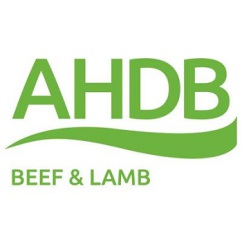
The biggest gain could be achieved by seam butchering lamb legs and selling them as topside mini-joints, thick flank mini-joints, silverside mini-joints and shanks instead of bone-in leg joints, he argued. That could result in an extra £63.2m in annual retail sales, he estimated.
Seam butchering beef shoulder and selling it as boneless Victoria Roasts as opposed to bone-in shoulder joints could also add over £5m to the annual retail sales value of the shoulder, he said.
In addition, he urged retailers and processors to explore tri-tip steaks, which had already seen real growth in popularity across Europe and America.
He urged butchers: “Continue to work on the quality and consistency of cuts and better butchery. There’s potential value in some cuts, which we overlook.”
Separately, conference attendees heard about trials on microwaveable bags for cooking raw meat by UK firm Excelsior Technologies, which it is testing with US partners.
“As it cooks, it expands and the air heats up and cooks the product,” explained Steve Wald, executive director for innovation at the Beef Innovations Group.
Wald said technology was evolving to the point where microwave cooking could produce much better- quality meat dishes than it used to.
He hoped commercial use of the bags could begin in the US from early 2016.
Ireland’s leading cooked meats company, Greene Farm Foods, has teamed up with Macfarlane Labels to launch new packaging for its products
The Reseal-it system offers an easy open and re-closable design that will be launched across the full range of cooked meats, including its sliced chicken, turkey and beef products, as well as its new ‘torn chicken’ range
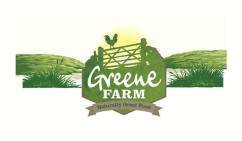
The resealable design means the meat products are kept fresh without the need of tinfoil and clingfilm to be used.
By keeping the meat sealed tight, it ensures the product remains fresh. Additionally, it extends the life of the food and helps tackle Britain’s problem with food waste.
“We are thrilled that our Reseal-it labelling system is a success for Greene Farm Foods,” said Angela Campbell from Macfarlane Labels. “The company identified a customer demand for their cooked meat products to have an easy-to-open pack with a reseal solution and early customer feedback has been encouraging. We look forward to working closely with Greene Farm Foods in the future on similar products.”
Macfarlane Labels assists leading brands across Europe, Canada and the US on products ranging from cheese to cookies.
Family-owned Greene Farm Foods roasts its meat at a state-of-the-art site in Ballygarvey, Northern Ireland using all-natural ingredients.
Owner of Greene Farm Foods, Kenneth Greene, commented: “We are delighted with the new Reseal-it label system on our range of cooked meat.
“Initial feedback has been positive and we understand it is helping consumers to manage their weekly purchases of cooked meats better. We are very pleased with the early results and we are now looking at the possibility of extending the use of Reseal-it to our other products.”
The Greene Farm range is available across Ireland and in some UK retailers
Pork supplier Karro Food Group has delivered a significant annual profit following a period of transformation.
It has posted an EBITDA profit of £8m for the year ended 31 December 2014, representing an £11m improvement on the previous year and the group’s first profit for many years.
The group’s turnover was £528m, similar to the previous year.
The company has had a tumultuous year – securing a £74m funding package from GE Capital and RBS Invoice Finance to support UK and international expansion and an acquisitions strategy in May, while in March it laid off 141 members of staff.
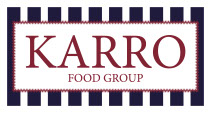
It also launched a £10m capital investment programme, financed from cash generated by the business, into processing and production across its UK manufacturing facilities, including an £8m leading investment at its largest facility in Northern Ireland –
Di Walker, executive chair of Karro Food Group, said: “Following its acquisition from Vion by private equity house Endless LLP in January 2013, Karro Food Group implemented a five-year plan to transform the underlying performance of our business through operational improvements that could deliver value to both Karro and its customers.
“It is therefore extremely positive to announce that Karro Food Group will have achieved the targets set out in that plan – namely to ensure Karro is fit for the future and firmly focused on growth – within just three years. This is an achievement reflected in these stand-out results and a clear recognition from our customers that the revitalised group is a very welcome market participant.
Walker added that the results would enable Karro to expand in the UK and internationally.
“Our firm focus moving forward is to continue this positive trajectory. We have an appetite to make acquisitions and this strategy will be supported by our recently announced £74m funding package.
“We also continue to be focused on organic growth and will further develop our retail and trade partnerships, as well as expand our international customer network in markets including Australia, China, Japan, South Korea and the USA.”
Chief financial officer Michael Kestemont said that the second year of Karro’s profit growth had been realised in a year characterised by significant competitive pressure within the UK pork industry.
He said: “With ongoing support of our funding partners, Karro Food Group is confident that 2015 will bring significant EBITDA and cash generation progression, driven by further capital investment and continuous operational and commercial improvements across the group.
“The increasing and consistent success of Karro Food Group and its strong financial performance is giving both suppliers and customers the confidence to want to grow long-term strategic partnerships with the group, cementing our position as a leading player in the UK and international pork industry.”
Three young butchers have been chosen to represent the UK at this year’s International Young Butcher Competition (IYBC), taking place later this month in the Netherlands.
The butchers who will be flying the Union Jack are Chris Riley, from the Huntingdon branch of Walter Smith Butchers, Peter Rushforth from Swans Farm Shop in Mold, Wales and George Parker of Frank Parker Butchers in Warwickshire.
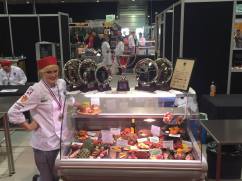
The butchers have to compete in six separate categories to display their skills in the bid to win the coveted title. This year will see the introduction of a ‘surprise’ category, where the competitors will be presented with a mystery box. Despite the new challenge, the young British butchers are not phased by this.
“You’ve got to be confident,” said 22-year-old Riley. Having already won several accolades, he is no stranger to competition.
“I always think you should aim high. If you’re going to go to a competition, then you should always aim for first place.”
Riley has previously won the Premier Young Butcher Competition, where he narrowly beat fellow competitor Rushforth to the top. “Next thing you know I’ve won that and everything has come together, and now I’m representing England,” exclaimed Riley. “It’s a dream come true.”
Rushforth, who has in the past won the Welsh Young Butcher of the Year, is feeling “overwhelmed” to have been chosen to represent the UK. However, he remains poised for when the competition takes place. He explained: “My confidence has grown week by week with the more practice I put in. It was a bit daunting at first because it’s quite a big deal.”
To ensure they are ready for the competition, the hopefuls have been receiving regular tuition from UK team coach and industry consultant Viv Harvey, alongside esteemed butcher Marco Peerdeman.
Keith Fisher, AHDB butchery development manager and chief executive of the Institute of Meat, will also be acting as UK judge. He will travel to Belgium with Harvey and the competitors later in the month when the competition gets under way.
The International Young Butcher UK Team is organised by the National Federation of Meat and Food Traders and is sponsored by ABP Food Group (UK), AHDB Beef & Lamb, AHDB Pork, Dalziel, the Institute of Meat, Leeds City College, Orange Butcher, Raps (UK), Weddel Swift and the Worshipful Company of Butchers.
Kerry Foods’ sausage brand Richmond is going for the try with its new rugby-inspired limited-edition flavors.

Available in grocery and impulse from September, the limited-edition flavours join the existing range and feature traditional tastes from around the UK, such as Scrum Cumberland, Line-Out Lincolnshire and Penalty Pork & Leek.
The brand’s original sausages will also get a rugby-inspired makeover for a limited period. The new flavours and packaging will be available for a limited time only.
“This is an ideal time to launch a disruptive ‘when they’re gone, they’re gone’ style range that we believe will add incremental sales and turnover to the category,” said Joe Hunter, brand manager for Richmond.
“We know that events throughout the year drive sales and the sausage category has natural seasonal peaks. Richmond tends to own big family moments such as Easter and Christmas, and to leverage that natural seasonal uplift even further, we are launching a limited-edition range of new flavours for the first time, to drive engagement and footfall within the category while exciting our existing customers.”
The limited-edition variants will be available in eight-packs and will be supported in-store marketing.
Eight firms are taking part in the pig industry scholarship scheme, run by AHDB Pork and Harper Adams
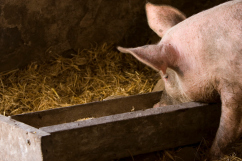
The next stage in the process is for the companies taking part to attend the scholarship fair taking place in October (this year). Here they will find the students they need.
“This year we have four new companies that have agreed to take part,” said skills and training co-ordinator Sam Bowsher.
“Overall that is slightly fewer than last year, but that is good for the industry as there is a constant flow of new firms which are providing opportunities for students. Existing companies are encouraged to dip in and out, according to the needs of the business.”
The training scheme is now in its third year. The students who are taken onto the scholarship programme will take part in a year-long placement. The sponsoring firm may be able to offer a post for the student once they qualify from the programme
Moy Park has invested £180,000 in four incubators at its hatchery in Craigavon, Northern Ireland.
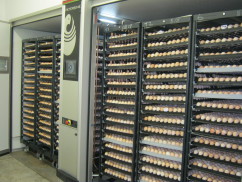
The new incubators increase capacity at the parent stock hatchery by 16% and give Moy Park greater control over temperature, humidity and ventilation.
As well as improving hatchability, the new technology enhances the welfare of the chicks by monitoring and supplying precise levels of fresh air and oxygen for eggs and chicks at all times during incubation. The incubators also consume 20% less energy that previous machines.
This investment follows Moy Park’s recent announcement that it has increased its output to five million chickens per week for the first time in the company’s 72 year history, representing an increase of 60% in the past 6 years; growing from approximately 3.1 million birds per week in 2009.
Stephen Bamford, grandparent manager, said: “The results we have seen so far from the new system have been fantastic. The sophisticated technology continually monitors the temperature of the eggs and adapts to fluctuations to ensure chicks are of a consistent, high quality. Moy Park is committed to delivering industry leading operating processes and facilities, and this is another example of our commitment to that goal.”
Supermarkets are “taking advantage of lamb farmers”, according to #NoLambWeek campaigners
Speaking to Meat Trades Journal, one of the farmers behind the #NoLambWeek campaign said it needed to happen to raise awareness of the issue.
Remaining anonymous to protect his identity and that of his farm, he explained how his business stands to lose £25,000 this year alone and that lamb prices are not going to increase anytime soon while the supermarkets keep retail prices the same.
“If they brought the price of lamb down, it would increase demand and we would all win. Instead though, they’re buying in lamb from New Zealand and flooding the market. We understand there are other factors affecting the market such as currency fluctuations but British supermarkets should be supporting British farmers and British produce but instead they’re just abusing them.”
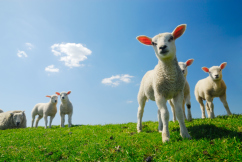
According to farmers, their share of lamb sold on supermarket shelves has dropped 10% from 60% to 50% in the last year. This led to a group of lamb farmers refusing to sell their prime lambs between the 1-7 August while some protested at supermarkets.
#NoLambWeek campaigners believed it brought the discussion into the open. “It was more a statement than a protest but it got the general public to realise how bad the situation is. Some farmers are struggling so much that they couldn’t actually afford not to sell their lambs during the week.
“We believe that supermarkets should bring the prices down to reflect the prices being paid to farmers.”
The campaign resulted in throughputs being down by 2% on the previous week as well as generating mainstream awareness of the issue.
It received plenty of support online from the industry however some independent butchers in the area were concerned that it would disrupt supply to their shops. #NoLambWeek campaigners apologised for the inconvenience but said “this is what we’re dealing with every day of the year”.
“It’s unlikely that lamb prices will rise again until spring so we’re stuck in this situation until next year. We do understand that the boycott did affect some butchers who stock and support British meat but supermarkets are screwing farmers and conning the public with their pricing when they should be doing more to promote it as an everyday option. That’s the way the lamb market will succeed. Local lamb is world famous but instead supermarkets are profiteering from cheaper meat from New Zealand and crippling British farmers.”
He added that if the practice continues, the lamb market might be damaged beyond repair. “Lamb consumption is down globally and work needs to be done to make it a viable option for consumers. Farmers and supermarkets should be working together to strengthen the lamb industry.”
The farmer also refused to rule out another #NoLambWeek boycott in the future should the disparity in prices continue.
“The last #NoLambWeek caused prices to increase but they’ve fallen back down again. We don’t have one planned but never say never. I’m not going to let my business die without a fight and neither will other farmers. We have to protect our businesses.”
Beef prices could begin to firm up in the coming months, Quality Meat Scotland (QMS) has forecasted, in welcome news for cattle farmers, who have faced falling prices during the first part of the year.
Stuart Ashworth, head of economics services with QMS, said the supply and demand pendulum would soon start to swing back towards farmers as availability of prime cattle in the UK started to diminish in the next quarter.
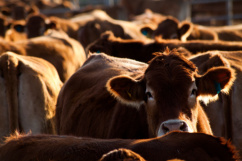
“We expect to see the volume of cattle arriving at abattoirs slow down. It is likely we will then see some firmness in the market for the beef producer,” Ashworth predicted.
Ashworth said a range of factors had led to falling prices at the start of the year, all based around supply and demand. The volume of beef produced over the first quarter increased 1%, due to cattle being slaughtered at heavier weights. In addition, the strong pound has meant imports have become attractive, and exporting has become more expensive.
“Add to that the increase in domestic supply and we find that the market has been working with around 8% more beef than a year ago,” said Ashworth.
That would not have been an issue if consumption had been strong, but while it has improved for some cuts, it has not been enough to absorb the extra supply.
“Some cuts have been selling better than others, but the product which is not selling well has been building up in processors’ chills and has had to find a market in the manufacturing trade, which has been proving sluggish,” added Ashworth.
“This explains why we have seen a slide in farm-gate prices and why some of our producers have been facing an extended period to get cattle to market.”
However, looking forward he said the outlook was looking more promising for beef farmers.
“We know from the British Cattle Movement Service (BCMS) data that the volume of cattle set to come forward as prime stock over the next six to nine months will diminish further and the same scenario is expected in Ireland,” said Ashworth. “This will mean the abattoirs will be able to manage the sale of less popular cuts out of their cold stores and the whole supply and demand balance will come closer together.”